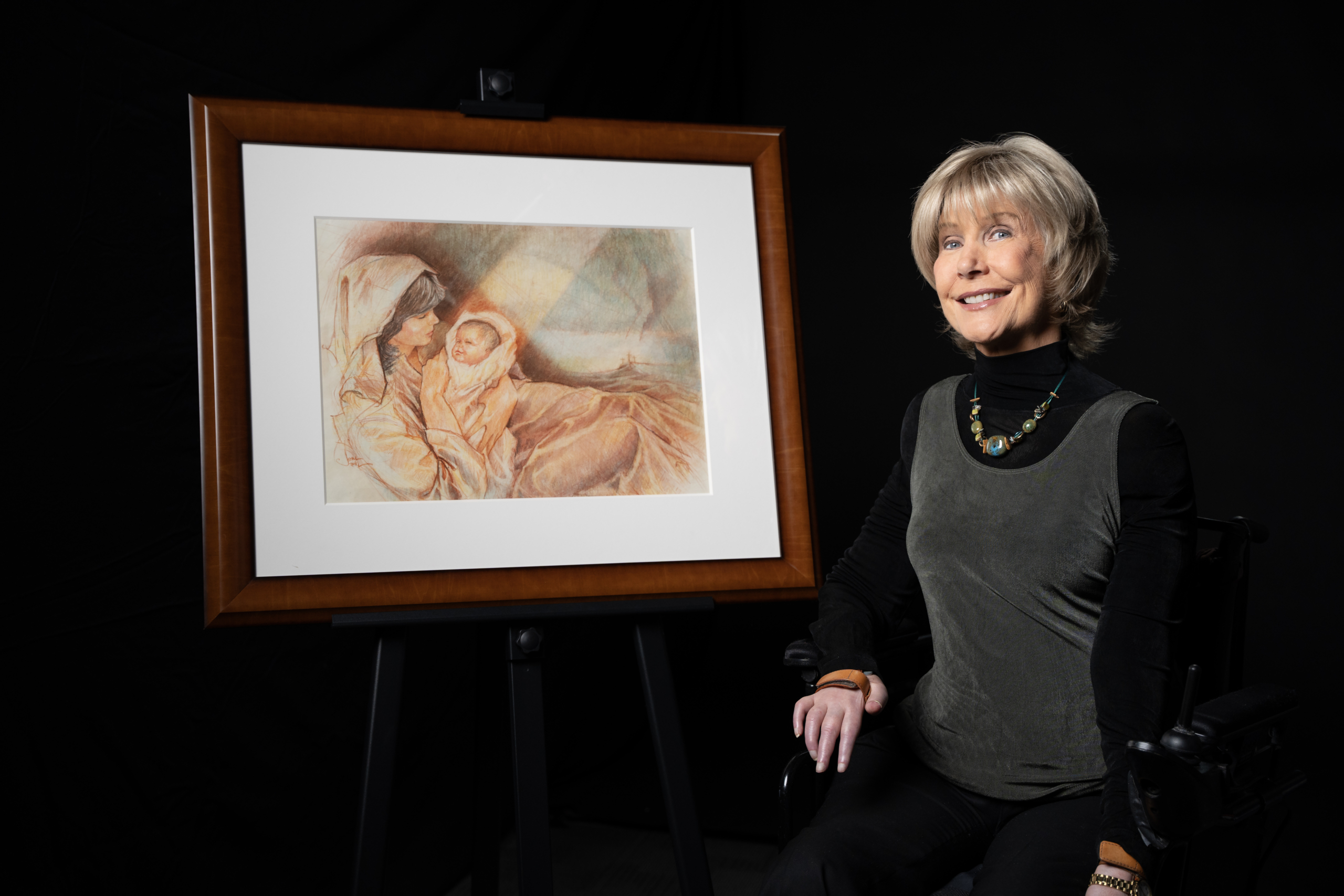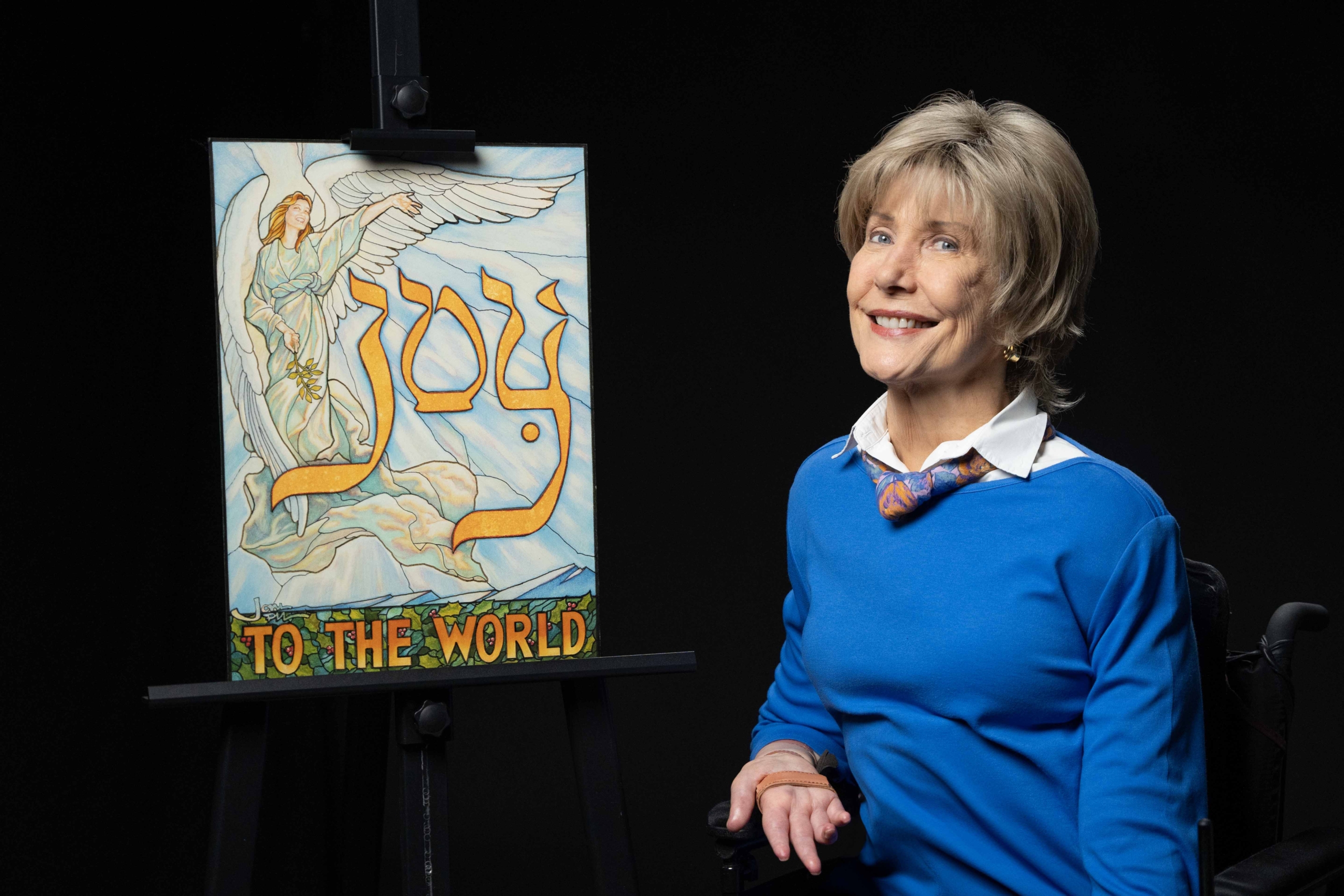Secrets to Good Caregiving: Spiritual Taproots and Practical Steps

What is the secret to good caregiving?
Just ask my husband Ken what has sustained him through more than four decades of caring for me with my quadriplegia, chronic pain, and multiple bouts with cancer.
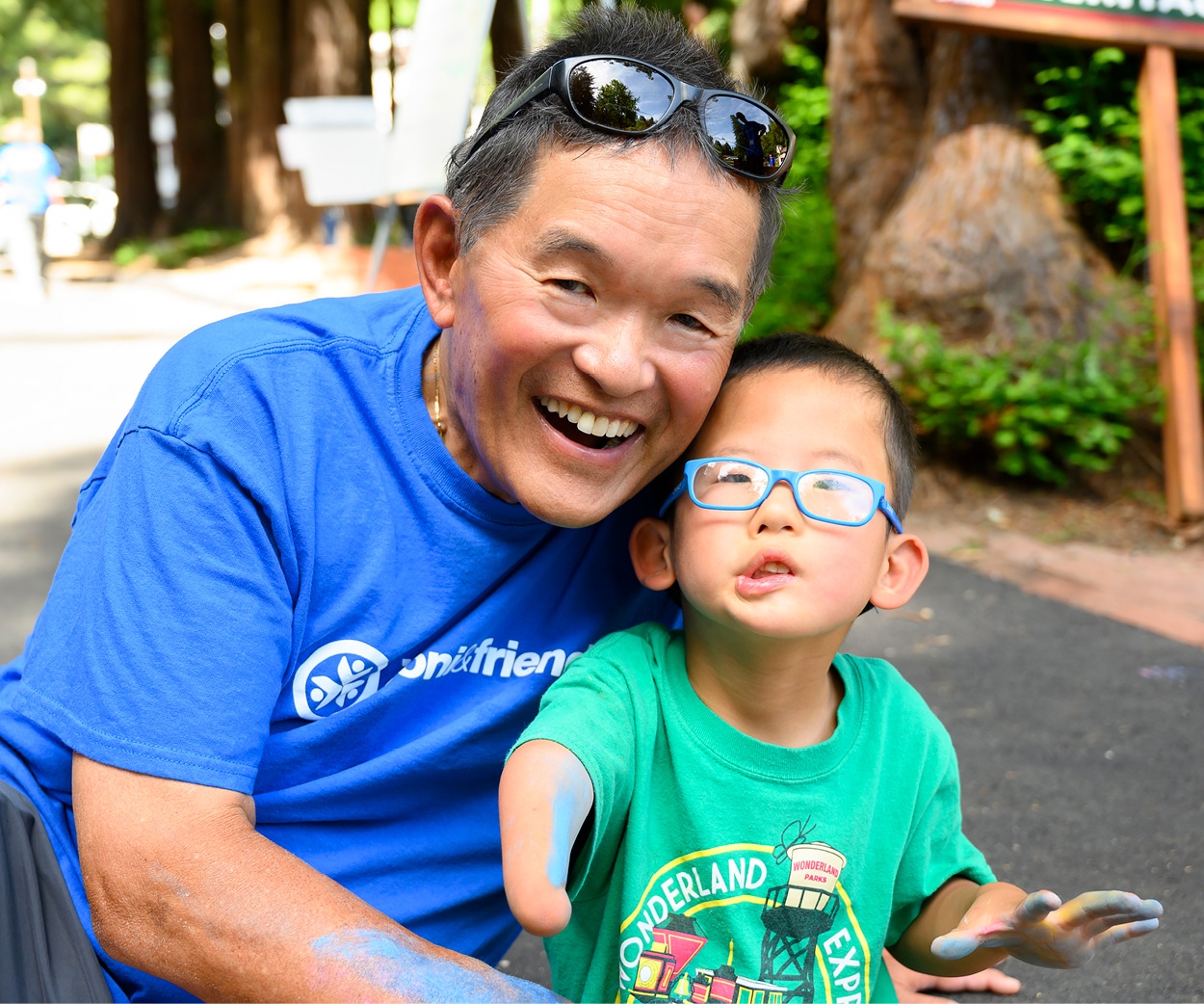
Ken will tell you: the secret to good caregiving starts with a spiritual taproot of constant dependence on Jesus!
Ken has observed that when his focus is on Christ, while caregiving may feel tiring, it doesn’t become tiresome.
He may get weary, but life doesn’t become wearisome. When he depends on Christ, Ken receives grace and energy in his work.
And in meeting my needs, Ken knows he also serves our Savior.
It’s like Paul tells us in Colossians 3:23: “Whatever you do, work at it with all your heart, as working for the Lord, not for human masters.”
As Ken put it, “Caring for someone like my wife, Joni, epitomizes the heart of Jesus himself who said, ‘For even the Son of Man did not come to be served, but to serve, and to give his life as a ransom for many,’ (Mark 10:45). It is my joy to give my life in service to Christ by caring for Joni. For no greater love does a man have for another, than when he lays his life down for that person. And sometimes that person just may be your disabled wife.”
Whether you serve by helping your wife with toileting routines or spoon-feeding your disabled child, you are serving the Lord Christ in addition to the individual you care for. That’s what sanctifies your work and makes it holy before the Lord. The Lord sees what you are doing and will pour grace and power into you as you carry out your tasks.
Secrets to Caregiving: Practical Steps
For caregivers, it’s not always easy to find the time, energy, or freedom to engage in adequate self-care practices. If this rings true for you, here’s an important reminder: you will do your best work as a caregiver when you care for yourself too. Consider the following three aspects of self-care, and think about how you can engage in each one, even in a small way.
Take care of your own body:
Ken has learned the importance of simply taking breaks amid caregiving stints to get some form of physical exercise. While I was going through chemotherapy, my sister flew out from Maryland to help us. Her presence allowed Ken opportunities to go for a walk or get to the gym. Getting endorphins flowing, clearing his head, and cultivating the discipline of taking care of his own body allowed him to return to caretaking refreshed.

It may be difficult to carve out opportunities for exercise, but it is well worth the effort. Likewise, while it may not be easy to get a full night’s sleep or cook a well-balanced meal, these things will pay off for you, and for the person you care for. If time and energy don’t seem to permit these kinds of self-care, read on.
Ask for help:
You may have noted in the example above that my sister Kathy’s visit made it possible for Ken to take much-needed breaks. Kathy is not the only helper on our team. We have many beloved friends who take part in my day-to-day care.
If Ken felt that he had to shoulder caregiving alone, the burden could quickly seem overwhelming. But we have learned to embrace the fact that we need other people.
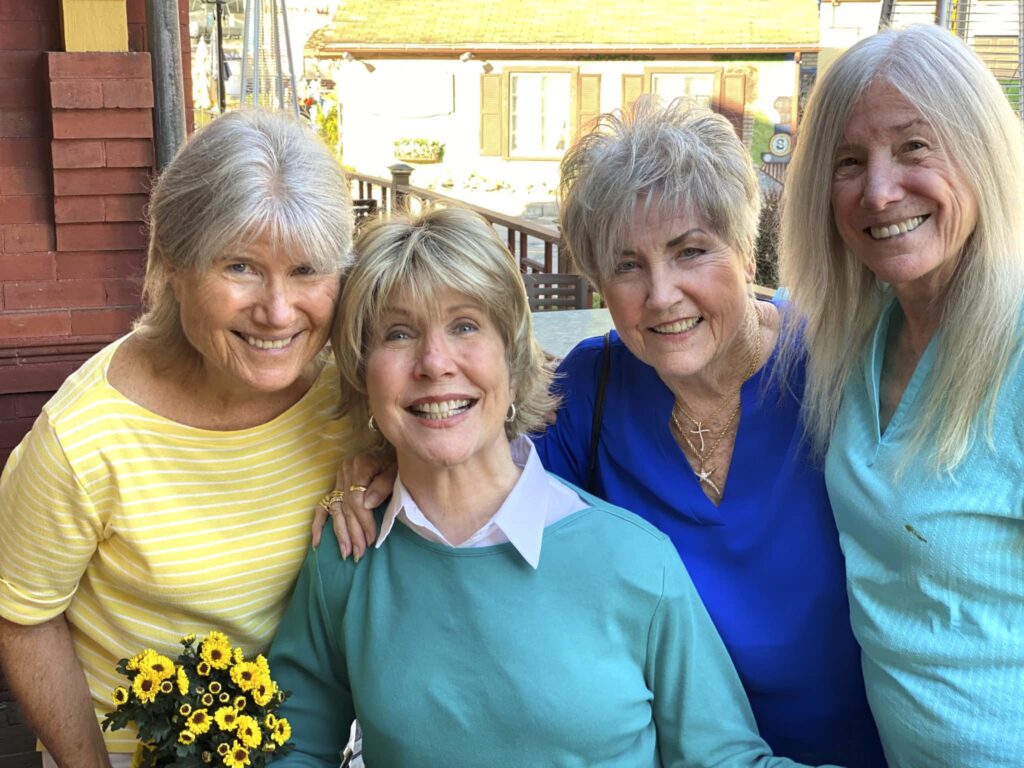
We cannot be too proud to ask for help. As we ask, we not only get help; we also lay down our pride and embrace humility (and humility has a way of keeping the devil at bay).
Of course, asking for help can be hard. But I have learned that asking can be a way of showing love and building intimacy. When we think of loving, we often think of giving. But I have come to understand from Jesus’s example that loving can also mean asking. At the most critical time in Jesus’s life on earth—the night before his crucifixion—he asked his disciples to, “Be with me, please. Just stay with me. Be with me through this time.” His asking for help demonstrated his love for his disciples. It was an act of vulnerability that made space for greater intimacy.
You see, asking is a way of drawing close to those around you. Maybe you have needed help (say for a ride to the doctor’s office or for provision of meals) but because of fear of burdening another, you have not asked. Let me encourage you not to be afraid, and to ask as an act of intentional vulnerability and love.
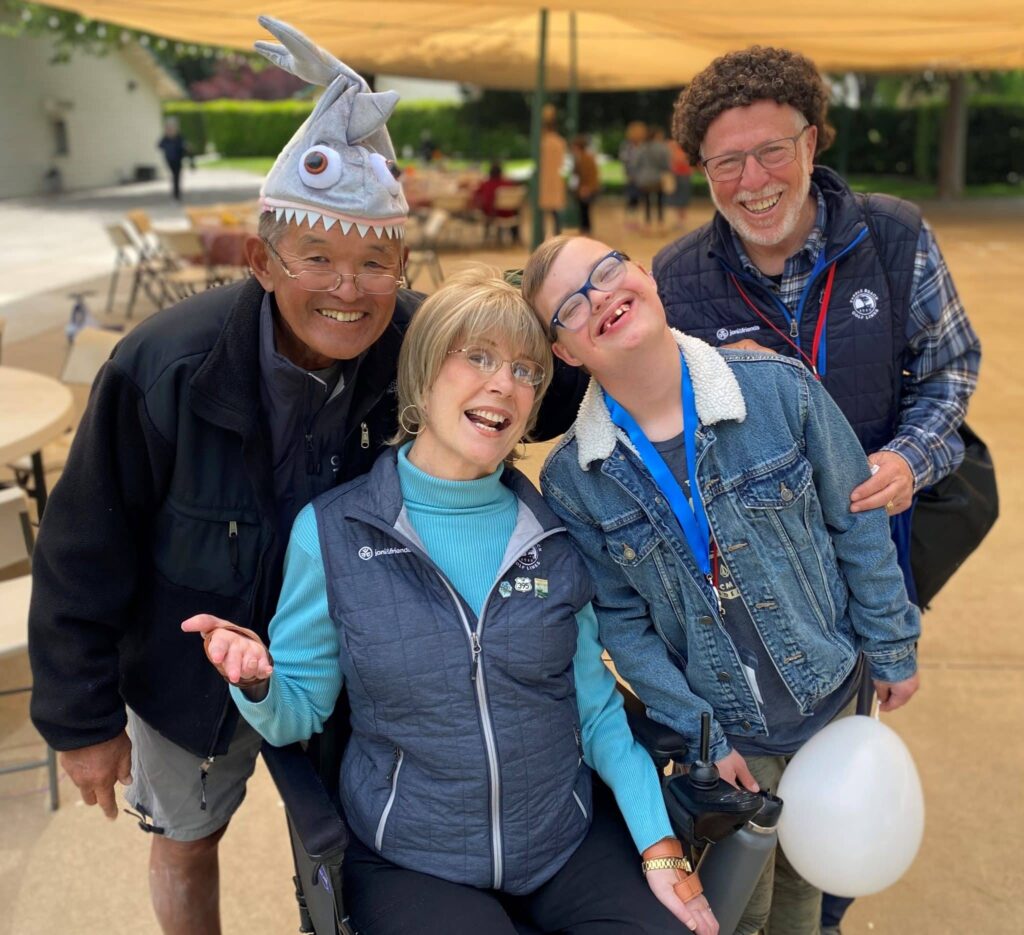
Cultivate genuine friendships:
One of Ken’s secrets to enjoying his role as a caregiver involves friends. Throughout our marriage, I have always supported Ken’s friendships with several key Christian men who encourage him and hold him accountable. One friend lives in Oregon, but they pray and study Christian books together over the phone.
Another friend lives nearby and he’s always ready to get together for lunch, play a game, or invite Ken to the high desert for an afternoon in the fields with his bird dogs.
Ken can share his feelings candidly with his friends and know that he is accepted and will get sound counsel. This gives him a place to express his emotions instead of bottling them up. Having genuinely close friends to walk with and to talk about life, with Christ at the heart of the conversation, strengthens Ken as a person and as a caregiver.
Keep the caregiver and care receiver on the same team:
Ken and I have learned to keep clear on the fact that the enemy we face is not my disability. Nor can we become one another’s enemy when we disagree on things. The enemy we face is Satan. We are in the midst of spiritual battle when we deal with illness, disability, and death.

At times, it is hard to stay on the same team, and Satan would have us divided and turned against one another. God would keep us united, and give us strength in our weakness.

Battle burnout:
Burnout is a common struggle for caregivers. In addition to the steps above, consider the following tips:
- Take one day at a time
- Accept your limitations and let go of guilt
- Create a daily routine and stick to it (including self-care)
- Keep a sense of humor
- Find a caregiver respite program in your community
- Consider modifications to the home and assistive devices
- Consider nursing and housekeeping services
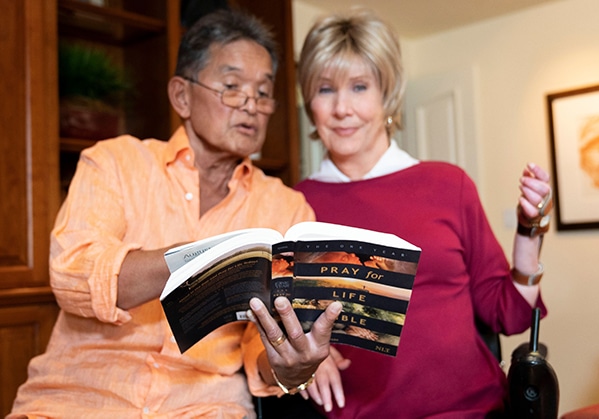
Finding Hope through Prayer
To truly depend on Christ, as caregivers and care receivers, we need to talk with him and listen to him. We need to discover the secret of “praying without ceasing.” Ken and I know firsthand that caregiving can push you and your loved one into some tight and uncomfortable places.
Through the years, we have learned that when tensions, fears, or pain press in, that should always signal us to pray.
When nerves are frazzled or we’re ready to throw in the towel, one of us will invariably say, “Let’s stop everything. We both know we’re in trouble. Let’s stop and pray.”
It may feel a little awkward to initiate prayer on the spot like that but, believe me, it’s a habit worth starting! When we turn to Christ and invite him in, acknowledging our need, he draws near to us. Even if circumstances have not improved, our spirits always feel brighter after we pray. The air seems clearer and the atmosphere lighter. The burden has lifted and whatever was harassing us just doesn’t feel as urgent. Most of all, we sense God’s hope.
It’s like Romans 15:13 says: “May the God of hope fill you with all joy and peace as you trust in him, so that you may overflow with hope by the power of the Holy Spirit.”
You can’t make it through caregiving (or care receiving) without hope! And while God provides hope, he also promises more—though sometimes not in the ways we expect. So if you feel that some caregiving needs just aren’t being met, stop and pray. Lift those needs to Lord with the expectation and confidence that he will hear you and respond. And count on God’s promises. Let’s look at a couple promises that will strengthen the heart of any caregiver:
Isaiah 58:11: “The Lord will guide you always; he will satisfy your needs in a sun-scorched land and will strengthen your frame.”
Philippians 4:19: “And my God will meet all your needs according to his glorious riches in Christ Jesus.”
Simply put, trust God with your needs, and he will meet them. Prayer is the energy that undergirds caregiving. Prayer connects you to Christ who is your primary and abundant source of hope and help in all things.
–Joni Eareckson Tada

The Caregiver’s Journey: Surviving to Thriving
When Susan’s husband Dave was diagnosed with Alzheimer’s disease at 55, their life went into disarray and caregiving became consuming for her. Following Dave’s passing in 2019, Susan founded her ministry to caregivers, providing a path from surviving to thriving in Christ.


